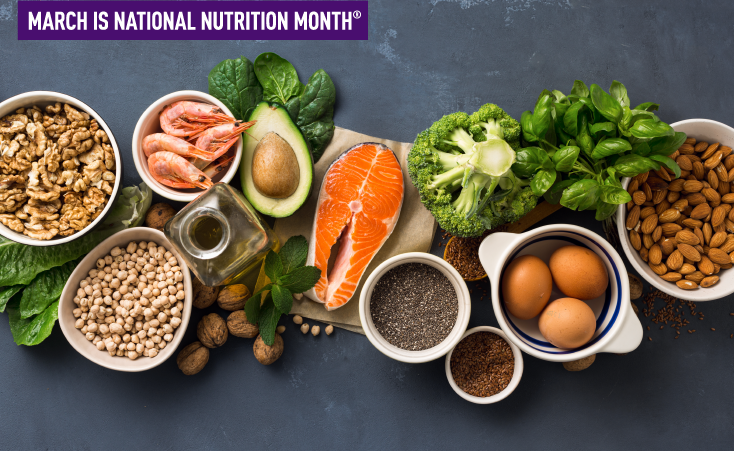
With so many different diets making headlines by promising better health and weight loss, it can be difficult to understand whether any of them are beneficial for patients with pancreatic cancer. As part of National Nutrition Month®, we asked Maria Petzel, senior clinical dietitian at MD Anderson Cancer Center and a past member of PanCAN’s Scientific and Medical Advisory Board, for her opinion on several popular diets. She weighs in on what patients with pancreatic cancer should know about each of them.
It’s important to note that each patient has individualized nutritional needs. Patients and their caregivers should consult with a registered dietitian or doctor before making any dietary changes.
What is the Paleo Diet?
The paleo diet, or paleolithic diet, is also known as the “hunter gatherer diet.” Its founders suggest that because the paleo diet mimics the patterns of food consumption humans had before the agricultural revolution, it optimizes how our bodies have evolved to digest nutrients and can aid in weight loss and weight maintenance.
Leafy vegetables, root vegetables, fruit, seafood, grass-fed meat, free range poultry and seeds and nuts form the foundation of the paleo diet. Grains, potatoes, dairy products, beans, legumes and processed foods are not allowed.
What Should Patient with Pancreatic Cancer Know About the Paleo Diet?
Though a paleo diet has good aspects, like cutting out processed foods, refined sugars and refined carbohydrates, all individuals should be cautious about any diet that cuts out an entire group of foods (i.e., grains, beans, and legumes in this one).
“We know a plant-based diet that includes whole grains and plant-based proteins can help reduce cancer risk and is recommended for cancer survivors,” said Petzel.
How may a paleo diet affect pancreatic cancer patients? Petzel believes not too positively.
“The lack of grains, plant proteins, and dairy foods puts an individual at risk for vitamin and mineral deficiencies” she said. “A paleo diet may be intolerable to individuals with pancreatic cancer due to the high-fat content of the diet used to achieve adequate calorie intake. It also limits some more common protein foods that may be staple sources for those with taste changes or food aversions during treatment.”
What is the Keto Diet?
The keto (ketogenic) diet is a high fat, moderate protein, low carbohydrate diet. A true ketogenic diet, which is designed to achieve ketosis, must be extremely low in carbohydrates (about 5 – 10% of calories would come from carbs), controlled in protein and extremely high in fat. Ketosis occurs when the body no longer has enough stored glucose to burn for energy. In this state, the body turns to fat reserves and the fat a person consumes for energy.
Foods recommended for the keto diet include fatty fish, eggs, butter and cream, cheese, red meat and poultry. Food that are avoided on the keto diet include grains or starches, most fruits, beans and legumes, root vegetables and sugary foods.
What Should Patients with Pancreatic Cancer Know About the Keto Diet?
The term “keto” is used very loosely to describe a wide range of low-carbohydrate diets. Scientific evidence is lacking for use of a low carbohydrate or keto diets in humans with pancreatic cancer and therefore we cannot draw any conclusions about efficacy of these types of diets.
“If patients are on pancreatic enzyme replacement therapy, they will likely need to adjust their enzyme consumption to account for the increased dietary fat,” said Petzel. “Higher fat diets, like keto, can be harder to tolerate for some patients with pancreatic cancer, even with enzyme adjustment.”
Petzel also cautions that, “the level of fat required for a true ketogenic diet has the potential to displace adequate protein intake and ketogenic diets pose a high risk for unintentional weight loss in patients, especially for those experiencing fat malabsorption.
The lack of fiber in the diet often leads to constipation, which could exacerbate other conditions like diverticulitis. And like other diets that severely limits some categories of foods, individuals are also at risk for deficiencies of important vitamins and minerals.”
What are Vegan, Vegetarian, Pescatarian and Plant-Based Diets?
A vegan diet eliminates any animal products, including fish, dairy or eggs. A vegetarian diet avoids meat but includes foods that come from animals, such as milk or eggs. A pescatarian diet has the basis of a vegetarian diet but includes fish/seafood but no other meats. A plant-based diet includes meals that are mostly vegetables, fruits, grains, beans, nuts and seeds.
What Should Patients with Pancreatic Cancer Know About Vegetarian, Vegan and Plant-Based Diets?
According to the American Institute for Cancer Research (AICR), a plant-based diet can lower risk for many cancers. To implement a plant-based diet, the AICR advises filling at least two-thirds of your plate with plant foods and one-third or less with animal foods like fish, poultry, meat or dairy products.
“There’s an overwhelming body of evidence that following a plant-based diet reduces cancer risk,” said Petzel. “The evidence is less clear that a vegetarian or vegan diet further reduces risk of cancer over a good plant-based diet and maintaining a healthy weight.
One study found that a pescatarian diet may have more health benefits than a standard vegetarian or vegan diet. A well-planned vegetarian diet has not been shown to have any bad effects on health, can provide all necessary vitamins and minerals, and can be more environmentally friendly.”














